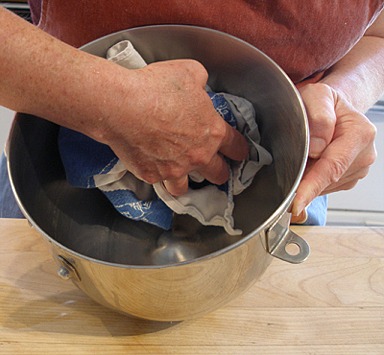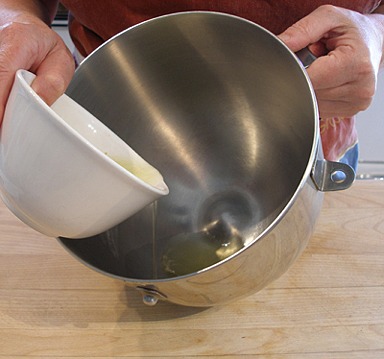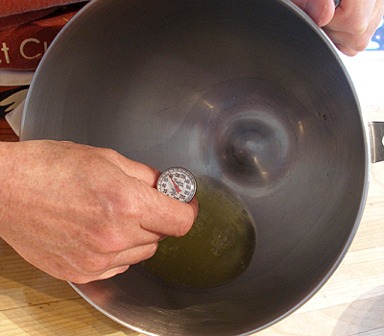 Some recipes, such as French Macarons, call for aging the egg whites. The thought behind aging egg whites is to reduce the moisture content as much as possible from the egg whites while keeping its protein bonds the same. The process is thought to increase the whites’ elasticity, better for whipping.
Some recipes, such as French Macarons, call for aging the egg whites. The thought behind aging egg whites is to reduce the moisture content as much as possible from the egg whites while keeping its protein bonds the same. The process is thought to increase the whites’ elasticity, better for whipping.
But is it necessary when using eggs purchased from the mass market grocery store in the United States, and when using electric mixers when making modern French macarons?
Some think that if you skip this step, that you may end up with a runny or watery macaron batter, ending in macaron disaster.
The necessity and technique of when and how to age egg whites has many different definitions depending upon who you you talk to or read. We at CraftyBaking.com decided to set the record straight.
Very few discussed the need to age egg whites for French macaron recipes when made with eggs purchased from grocery stores in the United States. After all, eggs processed in the USA are very different from those processed in Europe, and how eggs reach the market.
We found many differing opinions about aging egg whites in the United States: some say storing the whites in an airtight container in the fridge for 1 to 2 days ages them before making macarons. To some, that means letting the whites sit at room temperature in a bowl for a few days, sometimes up week, microwaving them or dehydrating them overnight in the oven before use.
SARAH SAYS: We found that a lengthy aging of egg whites is not necessary, and in fact, is not food safe. In fact, in the United States, based upon my research, a long aging of the egg whites is not really necessary, and the microwave or oven heat treatment “cooks” the egg whites rather than evaporating water from them. We have devised a safe and quick egg aging technique we use with all of our French Macaron Recipes: We recommend leaving egg whites uncovered at room temperature for two hours, and them warming them under gentle conditions before using in a French Macaron recipe.
CraftyBaking.com follows the FDA Food safety handling rules when we write recipes and make recommendations – The FDA recommends that perishable food items should remain out of refrigeration no more than two hours, otherwise you risk spoiling your food and getting food poisoning.
1. Producers in the US handle eggs in such a way that are meant to slow down the inevitable deterioration in egg quality.>>>they process them in such a way to avoid rapid deterioration.
2. Egg quality deteriorates as much in a day at room temperature as in four days under refrigeration Egg yolks deteriorate through aging much faster than egg whites>>> so, its best to keep it in refrigeration as long as possible to the last minute!
It's best to use your eggs cold from the refrigerator, rather than at room temperature and to buy them cold from the cooler. Egg yolks are more of a concern; not egg whites.
3. Agitation thins the whites, so its best to store them in an airtight container in an inner refrigerator shelf than in the door>>>Home storage has a great effect on egg quality and aging.
4. The only way to reduce the small chance of using a badly contaminated egg from salmonella poisoning is to buy only refrigerated eggs and is to keep them refrigerated until use.>>>craftybaking.com follows the FDA to the letter.
5. When you heat an egg, even a little in the microwave, the proteins unfold, and bond with each other and form a continuous meshwork. Thus, liquid egg becomes a moist solid and coagulates.>>>in essence, when you microwave and egg, you cook it. Eggs will coagulate at the lowest temperatures.
6. Other treatments that cause an egg to firm up and encouraging them to bond- using an acid, such as cream of tartar or lemon juice, and beating the into a foam. And, this does not run the risk of cooking them and having them coagulate into a solid. Acids (cream of tartar does the best job) also tenderizes.
7. Fresher eggs have a mild flavor, while older eggs have sulfur and ammonia notes. Egg age and storage conditions have a greater influence on flavor. The older they are and the more they are allowed to age, the fishier they taste. >>>> Thus, I'd rather use newer and fresher eggs with my macaron recipes!
HOW TO TIPS:
1. Allow the cracked egg whites to thicken by leaving them uncovered at room temperature for two hours. This is very important.
2. Then, warm the egg whites to around 75 – 76 degrees F. This is very important.
To warm them, run the mixer bowl under hot water and then dry. Add the egg whites to the bowl. Use an Instant Read Thermometer to measure.
SARAH SAYS: Do not skip; I have found you will get better results if you follow these steps.





